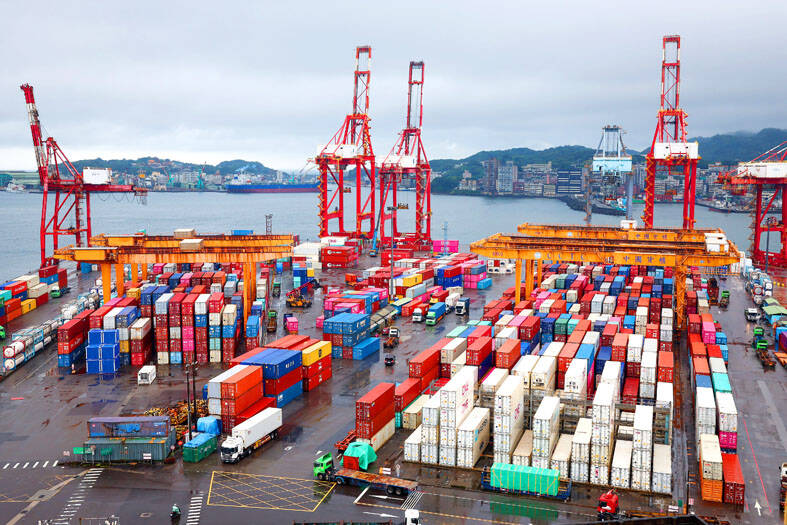Taiwan’s economy is expected to grow 4.45 percent this year, up from a 3.1 percent forecast in May, as stronger-than-expected exports and private investment offset global trade headwinds, the Directorate-General of Budget, Accounting and Statistics (DGBAS) said yesterday.
“While US trade policy changes continue to disrupt global commerce, robust demand for artificial intelligence [AI] and emerging technology applications is fueling expansion,” DGBAS Minister Chen Shu-tzu (陳淑姿) told a news conference in Taipei.
Global AI data center construction has remained sturdy despite the emergence of China’s low-cost DeepSeek platform, Chen said, adding that Washington’s recent relaxation of restrictions on chip sales to China has also sped up deliveries of advanced semiconductors and information and communications technology (ICT) products.

Photo: CNA
Electronic components and ICT goods now account for more than 70 percent of Taiwan’s exports, she said.
Second-quarter GDP rose 8.01 percent from a year earlier, slightly above a 7.96 percent estimate last month, after exports in US dollar terms surged 34.06 percent. Full-year exports are expected to reach a record US$589.2 billion, up 24 percent from last year, driven by the ongoing AI boom, the official said.
The DGBAS now projects GDP growth of 2.91 percent in the current quarter and 1.72 percent in the fourth quarter, a noted improvement from the near-zero outlook in May.
The impact of the US tariffs should be manageable, as major Taiwanese firms have built manufacturing facilities in the US and other tariff-friendly markets to cushion the blows of US tariffs and potential semiconductor duties, Chen said.
On the domestic front, private consumption in the second quarter rose 0.49 percent, contributing 0.22 percentage points to GDP growth. However, gains in food, entertainment and transport spending were partly offset by weaker car sales and a drop in stock market turnover, the official said.
Private investment, another bright spot, rose on capacity expansions in advanced manufacturing and the rollout of new production lines for semiconductors, electric vehicles and renewable energy, the DGBAS said.
As a result, first-half GDP expanded 6.75 percent and is forecast to increase 2.3 percent in the second half.
The consumer price index is expected to rise 1.76 percent this year, slowing from last year’s pace and back within the central bank’s 2 percent target, giving room for maintaining a neutral monetary stance.
Risks to the outlook include the scale of US tariffs, the speed of AI and high-performance computing adoption, domestic policy responses, geopolitical tensions, and global monetary policy shifts, Chen said.
The DGBAS forecasts GDP growth of 2.81 percent next year, as the effects of tariffs and front-loading fade.
While the IMF expects global trade growth to slow to 1.9 percent next year, Taiwan’s exports are seen rising 2.19 percent to another record of US$602.1 billion, buoyed by sustained AI-related demand from global technology companies and governments building AI infrastructure, the DGBAS said.

NEW IDENTITY: Known for its software, India has expanded into hardware, with its semiconductor industry growing from US$38bn in 2023 to US$45bn to US$50bn India on Saturday inaugurated its first semiconductor assembly and test facility, a milestone in the government’s push to reduce dependence on foreign chipmakers and stake a claim in a sector dominated by China. Indian Prime Minister Narendra Modi opened US firm Micron Technology Inc’s semiconductor assembly, test and packaging unit in his home state of Gujarat, hailing the “dawn of a new era” for India’s technology ambitions. “When young Indians look back in the future, they will see this decade as the turning point in our tech future,” Modi told the event, which was broadcast on his YouTube channel. The plant would convert

‘SEISMIC SHIFT’: The researcher forecast there would be about 1.1 billion mobile shipments this year, down from 1.26 billion the prior year and erasing years of gains The global smartphone market is expected to contract 12.9 percent this year due to the unprecedented memorychip shortage, marking “a crisis like no other,” researcher International Data Corp (IDC) said. The new forecast, a dramatic revision down from earlier estimates, gives the latest accounting of the ongoing memory crunch that is affecting every corner of the electronics industry. The demand for advanced memory to power artificial intelligence (AI) tasks has drained global supply until well into next year and jeopardizes the business model of many smartphone makers. IDC forecast about 1.1 billion mobile shipments this year, down from 1.26 billion the prior

People stand in a Pokemon store in Tokyo on Thursday. One of the world highest-grossing franchises is celebrated its 30th anniversary yesterday.

Zimbabwe’s ban on raw lithium exports is forcing Chinese miners to rethink their strategy, speeding up plans to process the metal locally instead of shipping it to China’s vast rechargeable battery industry. The country is Africa’s largest lithium producer and has one of the world’s largest reserves, according to the US Geological Survey (USGS). Zimbabwe already banned the export of lithium ore in 2022 and last year announced it would halt exports of lithium concentrates from January next year. However, on Wednesday it imposed the ban with immediate effect, leaving unclear what the lithium mining sector would do in the